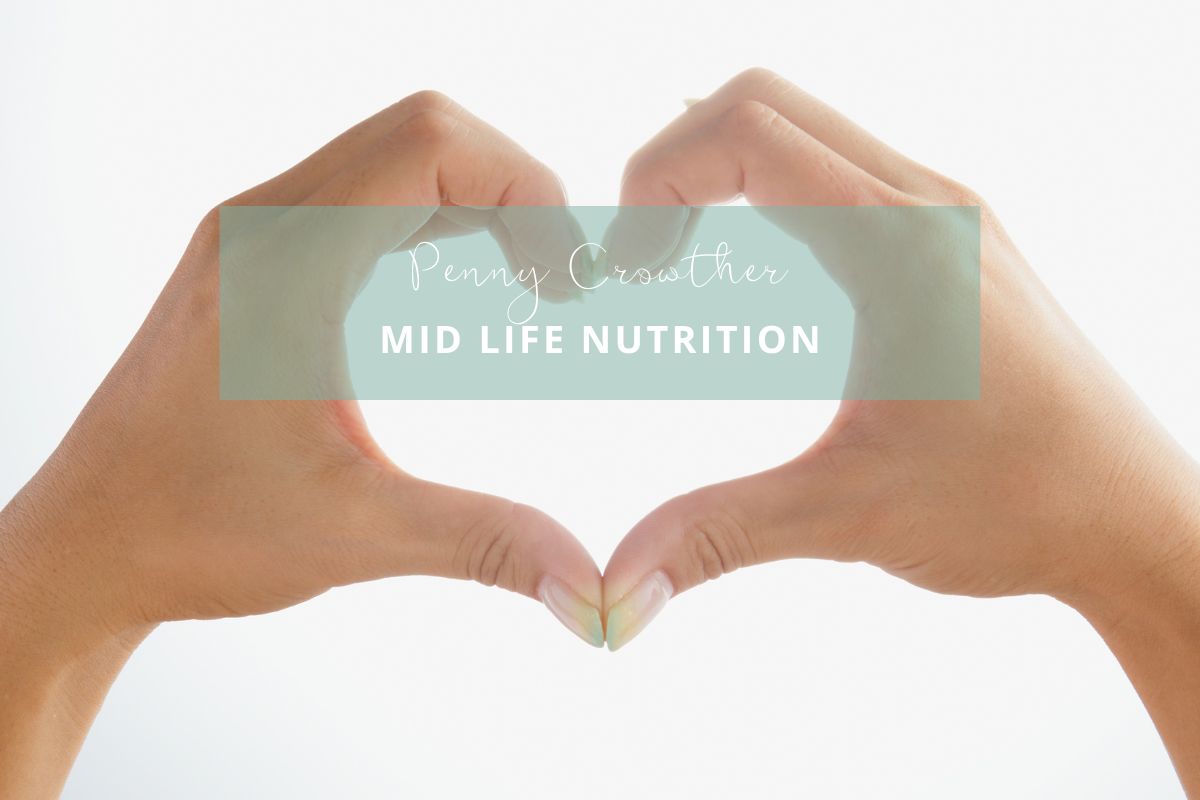
In this blog I’m going to focus on a very important organ which isn’t often given the attention it deserves in women – the heart. I’m going to give you some tips on how to keep your heart healthy. You’ll also find some heart warming soup recipes here full of healing antioxidants.
Prioritise your heart health!
Heart disease in women is a major issue. Over half the deaths in women over 50 are related to cardiovascular disease. More women die from it in the UK, than breast cancer That is HUGE.
When it comes to preventing heart attacks, it is often men who are the target of health campaigns. Yet, declining levels of oestrogen with ageing, actually put women more at risk of heart disease. Oestrogen has a protective effect on the heart and blood vessels and helps maintain balanced cholesterol levels and blood pressure. Oestrogen can start declining in peri menopause and accelerate post menopause. Women who go through an early menopause from age 45 or younger are at considerably increased risk.
Some recent, interesting research has indicated that having hot flushes is associated with increased risk for heart problems. However, don’t panic because not all women who have hot flushes go on to develop heart disease.
The takeaway of all of this for women is to start looking after your heart! There is plenty you can do diet and lifestyle wise.

Heart Lifters
7 Super Heart Friendly Foods
- Green Tea is rich in substances called catechins which are powerful antioxidants.
- Magnesium is super important for the proper functioning of the heart and blood vessels. It is also a mineral that women especially don’t get enough of. Where can you get your recommended 300mg magnesium daily?
The best food sources are beans, seeds (ground up to help absorption of magnesium), dark chocolate, mackerel, spinach, almonds and cashews. Avocados also contain some.
Meat does contains some but not super high amounts.
All in all, getting enough magnesium through food can be quite a challenge and a supplement may be beneficial. The type and amount you take is important and caution is needed with certain medications. Read more detail on magnesium for the menopause in this blog - Garlic has been shown in quite a lot of research to have beneficial effects on cardiovascular health. To get the potency used in the studies, garlic extract is needed but fresh garlic adds great flavour to food and will have some benefit.
- Cayenne is excellent for circulatory stimulation.
- Turmeric is best known as the main ingredient of curries, providing the characteristic deep orange/yellow colour. More and more studies are revealing its potential health benefits which come from the active ingredient curcumin, a potent antioxidant and anti inflammatory agent. Turmeric has a positive effect on cholesterol levels and may help keep the blood thin and avoid clotting.
- Blueberries are high in plant nutrients called flavonoids. Recent research found that women who eat 3 or more servings of blueberries or strawberries may reduce the risk of heart disease.
- Hearty Fats. Omega 3 fatty acids from fish, seeds, nuts and cold pressed oils such as flax, are vital for protecting the heart and circulation. Fats such as these draw oxygen into the cells. They help keep the body fats fluid thereby preventing fatty deposits from obstructing the arteries. In addition, essential fatty acids generate electrical currents that keep the heart beat regular.
If your skin feels very dry, that is often a good indication that you are lacking in essential fats.
A Mediterranean style diet
- The Mediterranean diet rich in antioxidants, is associated with reduced risk of heart disease.
We need a constant supply of antioxidants from our food, to help protect our heart and blood vessels from damage.
Here are some delicious soup recipes which provide abundant antioxidants!
- Bring colour into your diet - to get the widest range of plant antioxidants choose as many coloured fruit and veg as possible. Here are some seasonal suggestions for October in the UK to bring much needed colour through gloomier autumn days
WHITE Apples, pears, white cabbage, cauliflower, celeriac, chicory (great raw in salads), fennel, turnip, garlic, parsnips, kohlrabi, horseradish (try Tom Kerridge’s recipe on BBC good food for Kohlrabi & horseradish slaw), fennel (chop up the bulb and eat raw or cooked)
RED Beetroot, red cabbage, aubergines
GREEN Broccoli, Brussels sprouts, spring greens, leeks, lettuce, watercress, kale, marrow, celery, rocket, spinach
ORANGE & YELLOW Butternut squash, carrots, swede, pumpkin, sweetcorn
Sparking Joy
You’re probably familiar with the phrase “sparking joy” coined by Marie Condo, the well known Queen of Tidying! Her philosophy is that if a possession, be it clothing or ornaments, doesn’t spark joy, get rid of it. In ancient Chinese medicine joy was the emotion associated with healing the heart. It was closely linked with connection to others and connection to the natural world.
It’s thought that the benefits of the Mediterranean diet don’t come just from the food itself. It’s also HOW the food is eaten i.e. sharing the food in company along with the pleasure and enjoyment that brings. Mediterranean folk take time over meals and food is closely linked with social connection.
Heart Drainers

Stress
The heart is not only a physical organ, it is also thought of as being our emotional centre.
- When we are stressed and the adrenaline is pumping, blood pressure and heart beat increase. The stress response is designed to put us in a state of emergency so we can cope with the perceived threat.
- If instead of being a short lived response, you are frequently in the stress response and your body is being run by the sympathetic nervous system, it works the heart very hard.
- The body needs to be in the relaxation response (parasympathetic nervous system), in order for the natural healing and repair mechanisms to work.
- Ongoing stress also causes inflammation which is linked with raised blood pressure, blood sugars and cholesterol. These factors make heart disease more likely.
- Even minor stress affects the heart by constricting blood and oxygen flow to the heart muscle.
And, long-term stress can affect how the blood clots. This makes the blood stickier and increases the risk of stroke.
- The role of emotional stress in heart disease is now fully recognised. Bottled up feelings especially of anger or grief need an outlet. Try journaling as an inexpensive form of therapy!
- Laughter, fun & hobbies are supportive to the heart.
- Ending on a nutritional note, refined sugars, processed fats, carbonated drinks, salt, alcohol and excess caffeine can all unbalance the heart.
